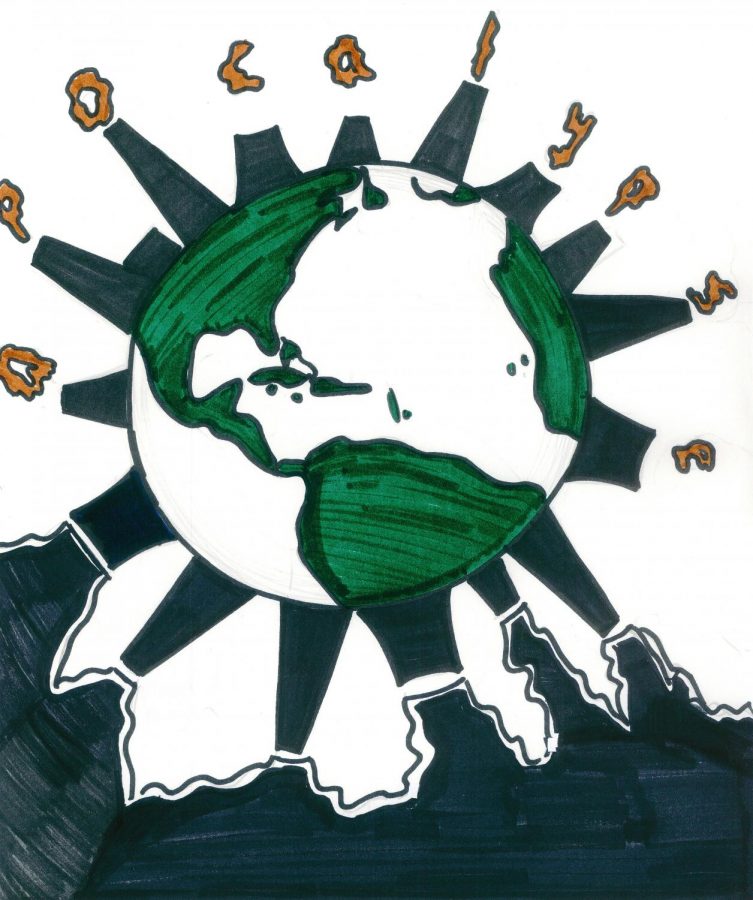Environmental Apocalypse: 12 Years Until Our Impending Doom
February 12, 2019
According to the world’s leading climate scientists, we only have twelve years to reduce and reverse the long-standing effects of climate change before the earth goes up in flames. If humankind’s ways of pollution and wastefulness continue to go unchecked until then, the average global temperature will rise 2℃ (compared to the pre-industrial average), which will cause the destruction of coral reefs, iceless summers in the Arctic, and droughts, flooding, and worldwide famine.
The heightened temperatures put us on track for irreversible damage to the climate and sets up the rise of the global average temperature 3℃ by the end of the century, causing the flooding of coastal lands everywhere and a massive influx of immigration due to displacement in a social environment not so welcoming of foreigners.
Sounds terrible, right? But who caused this destructive snowball effect of pollution, deforestation, and anti-environmental protection? People who drive a car instead of bike? Plastic straw users? People who left their reusable grocery bags at home and had to buy a plastic one?
The truth is, 100 companies are responsible for 71% of global emissions, according to an article by The Guardian.
When we think of the world in a macro sense, mass industrialization didn’t occur all that long ago. In the last two centuries, industrialization and capitalism have destroyed the earth’s environment and atmosphere. Why do I say this? Because the deregulation of companies allows them to produce industrial goods, crops, livestock, and luxuries by cheap, environmentally unsafe methods. As companies compete with one another to sell high quality products at low prices, cutting production costs is essential. The drive to make profit overcomes the very dire environmental cost, so large companies put money and manpower to lobby the government to deregulate environmental protection laws.
So in this horrible hellscape late capitalism has created for us, how do we, a small portion of humanity, combat it?
A simple and cost-effective method of helping the earth is to set up a recycling routine in your home. If you aren’t already, throw clean papers, cardboard materials, and foam into the blue recycling bin at home, not in the trash. You can also throw bottles and cans in there for recycling, but you can also make money from them! By collecting the cans and bottles you use over the course of a few weeks, you can take it to your local recycling center and collect cold, hard cash for the weight of your recyclables. You can also pressure your teachers at school to set up designated recycling bins. A bunch of paper gets thrown into the dumpster at school, so recycling it lessens your whole classroom’s negative impact on the environment.
While having every home in Los Angeles convert to solar energy would be great, it isn’t the easiest goal to reach. What you can do to conserve energy at home is turn off the lights in rooms you aren’t in, use energy-efficient swirly light bulbs, reduce your usage of heating and air conditioning when you don’t need it, and make sure your faucets aren’t running when they aren’t in use. These are common-sense type tips, but some people need to be reminded of them. All of these things also put less strain on your wallet!
Just like wasting energy or water, don’t waste food! Try not to buy excess amounts of food or let it expire. It’s a waste of money and nutrition. With that being said, try to reduce the amount of meat or animal products in your diet. The top five animal agriculture companies produce even more emissions and greenhouse gases than leading oil companies Exxon, Mobil, BP and Shell. Beef specifically is huge water waster. Just a 1/3 pound burger requires 660 gallons of water to make, according to the Los Angeles Times. It’s a big step to go from a meat lover to a vegan, so just give the veggie burger or the salad a try once in a while. It’s a great way to explore new culinary tastes and be environmentally conscious, and it actually tastes pretty good!
While the efforts of one individual may seem futile, the collective efforts of millions of people around the world add up and do make a difference. With the looming threat of an impending apocalypse, hopefully you’re more inclined to try out some easy ways to minimize your carbon footprint.









 Watch the full video o
Watch the full video o







![Taylor Swift’s newest album titled Midnights 🌙 takes a deeper look at the persona of Taylor herself, and according to reporter Alina Miller, although this isn’t Taylor’s best work, there are highlights worth mentioning about. 💫
Click the link in the bio to check out the full article!
[Photo Caption: Taylor Swift hits all top 10 spots on Spotify’s Billboard Top 100 chart]
#taylorswift #midnights #tiktok #antihero #spotify](https://scontent-iad3-1.cdninstagram.com/v/t51.29350-15/314744727_1556543814822641_1643591421920256829_n.jpg?_nc_cat=110&ccb=1-7&_nc_sid=8ae9d6&_nc_ohc=aDxNzq2snTYAX_gAl0G&_nc_ht=scontent-iad3-1.cdninstagram.com&edm=ANo9K5cEAAAA&oh=00_AfBa4EluVzZT-7d5rKyT6tLJo0UJuCvRJPSCMX71aeO38Q&oe=63965890)



 Watch the full video
Watch the full video 
